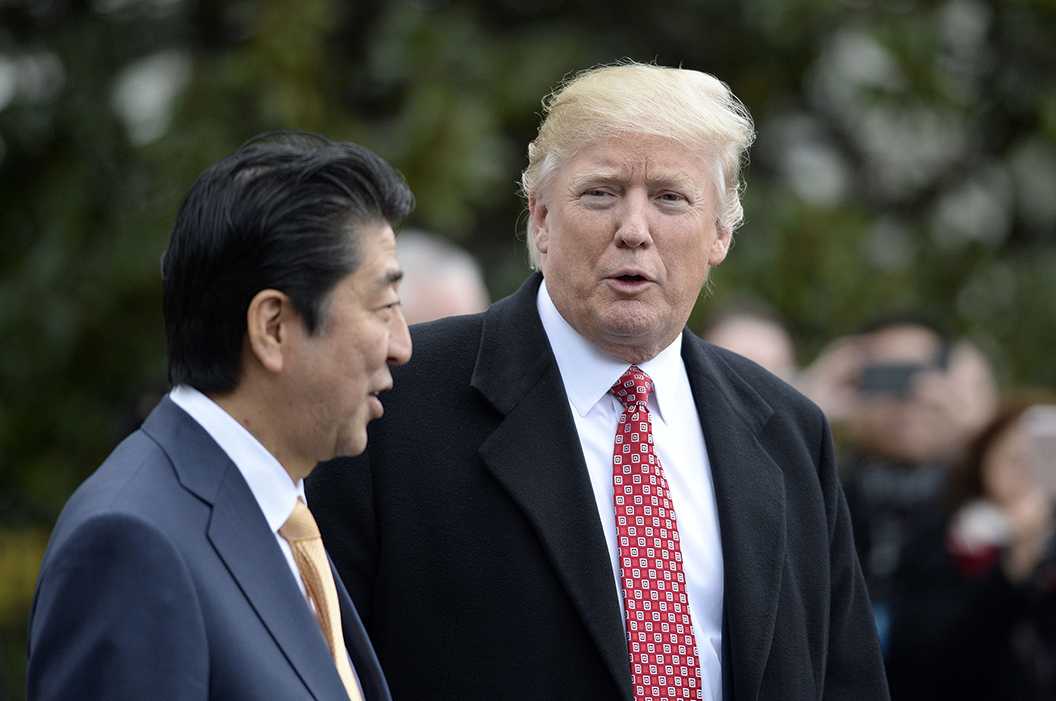Photo Courtesy of Tribune News Service | President Donald Trump and Japanese Prime Minister Shinzo Abe depart the White House on Feb. 10, 2017 in Washington, D.C.
By Hayden Welty ’19
THE ROUNDUP
In this new era of presidential politics, it has become increasingly important for the media to keep deceit at bay and away from the public.
It is the job of a journalist to report only the facts. However, in contemporary American politics, the line between fact and fiction has become increasingly blurry.
An onslaught of outright lies and twisted facts have been spewed out to the public, blinding us and our ability to differentiate between reliable news and outright falsities.
The rise in accusations of “fake news” and the “liberal media” has also led to a widespread distrust in American news outlets, indicated by a poll from Gallup last year, which showed that only 32 percent of Americans have a “great deal” or “fair amount” of trust in the media.
The emergence of this phenomena, combined with the ascension of a dubiously untruthful president willing to tell outright lies from the White House’s pulpit, has forced the media to face a crucial decision: Should journalists just report what is said by quoting a president who is spewing outright lies or should they treat objectively false statements with an alternative approach?
If journalists choose to “fact-check” the president, they might be accused of being the “liberal media,” and if they chose to print outright lies, even if they are said from a normally reliable source like the president, then they run the risk of being jeered at as “fake news.”
There is much middle ground between the notion that a news organization is purposefully spreading lies to achieve a common goal and the notion that a news organization is too lazy and incompetent to check its own facts before publication.
However, it does illustrate the complicated set of ethical questions that have come up in journalism over the course of the 2016 election.
Most people would say that if a statement is objectively false, then a journalist should just provide facts, which disprove the validity of what someone stated.
An issue arises, however, when we consider that, in many cases, a journalist does not have the means to dig up the appropriate statistics or facts that can resolutely disprove lies. If concocted from thin air, some lies just cannot be fact checked.
For example, there was a dispute over the number of people who watched President Trump’s inauguration, both at home and at the Capitol. But no one can definitively prove who was right since the National Parks Department does not keep an exact count of attendees and the number of people watching online or on TV cannot be easily or accurately compiled.
I am not a philosophy professor, and I cannot give you a straight answer as to how the press should respond in this new “Trump Era”
But I absolutely do believe that the media must play a key role in making sure that the truth is revealed to the public.
Ever since the beginning of democracy up to the modern era, the press have played a vital role in keeping our democracy flourishing, whether it’s Thomas Jefferson’s praise of the press or Upton Sinclair’s muckraking work in “The Jungle,” the media has always been a staple of our democracy.
It’s especially concerning to me when you watch a president and a staff that is willing to spout outright lies from the highest office in our country. The worst part is that they’re usually able to get away with it too.
So far in the Trump administration shows like “Saturday Night Live” have been addressing the president’s affinity for the outrageous with eloquence and effectiveness, hitting a 22-year high in ratings, according to CNN, and providing a valuable outlet for Americans’ frustrations.
Other notable work from comedians Seth Meyers, Samantha Bee, Stephen Colbert and Trevor Noah entertain and inform the masses.
My hope is that both comedians and the more serious media outlets are able to keep this administration in check, making sure that they report not just the facts, but ones that are truthful too.




















